Joshua Tree overcrowded? In this starry desert three hours from L.A., disconnect.

Is Borrego Springs the next Joshua Tree? Probably not.
The next Palm Springs? Nope.
But this lonely San Diego County desert town, about three hours southeast of L.A. City Hall and 50 miles from the nearest Starbucks, deserves the attention of anyone who really, truly wants to get away from it all. It’s a desert outpost, home to perhaps 4,000 year-round residents, star-struck by night, startling at dawn.
The dark skies and aimless days are what draw many people. Also the wildflowers in spring (or in a rare occurrence, this winter). The occasional bighorn sheep. The stark Santa Rosa Mountains, glowing at dusk. Also the big metal sea serpent.
“The desert can be an addiction,” said Steve Mollering, 62, a part-time Borregan who has been visiting since he was a child.
Purple sand verbena adds color to the desert landscape in Borrego Springs. It’s a rare sight this winter.
(Myung J. Chun / Los Angeles Times)
And lately, as Mollering and many of his neighbors have noticed, this corner of the desert might be changing a little. In a quiet evolution that looks nothing like the recent burst of growth and action in Joshua Tree, Yucca Valley and the Coachella Valley, the lodgings, restaurants and attractions here are doing some new things.
The old Anza Borrego Tennis Center — four courts, a pool and a clubhouse, basically — has been made over by a pair of Insta-savvy young designers, who have dubbed it the Courts, cultivated a cosmopolitan vibe and added a pair of rentable vintage trailers.
New owners are reinventing the Hacienda del Sol, a long-slumbering 1947 motel in the middle of town. For perhaps the first time in decades, the motel’s snappy interiors follow through on the Modernist revival glory promised by the Hacienda’s vintage orange-and-yellow sign.
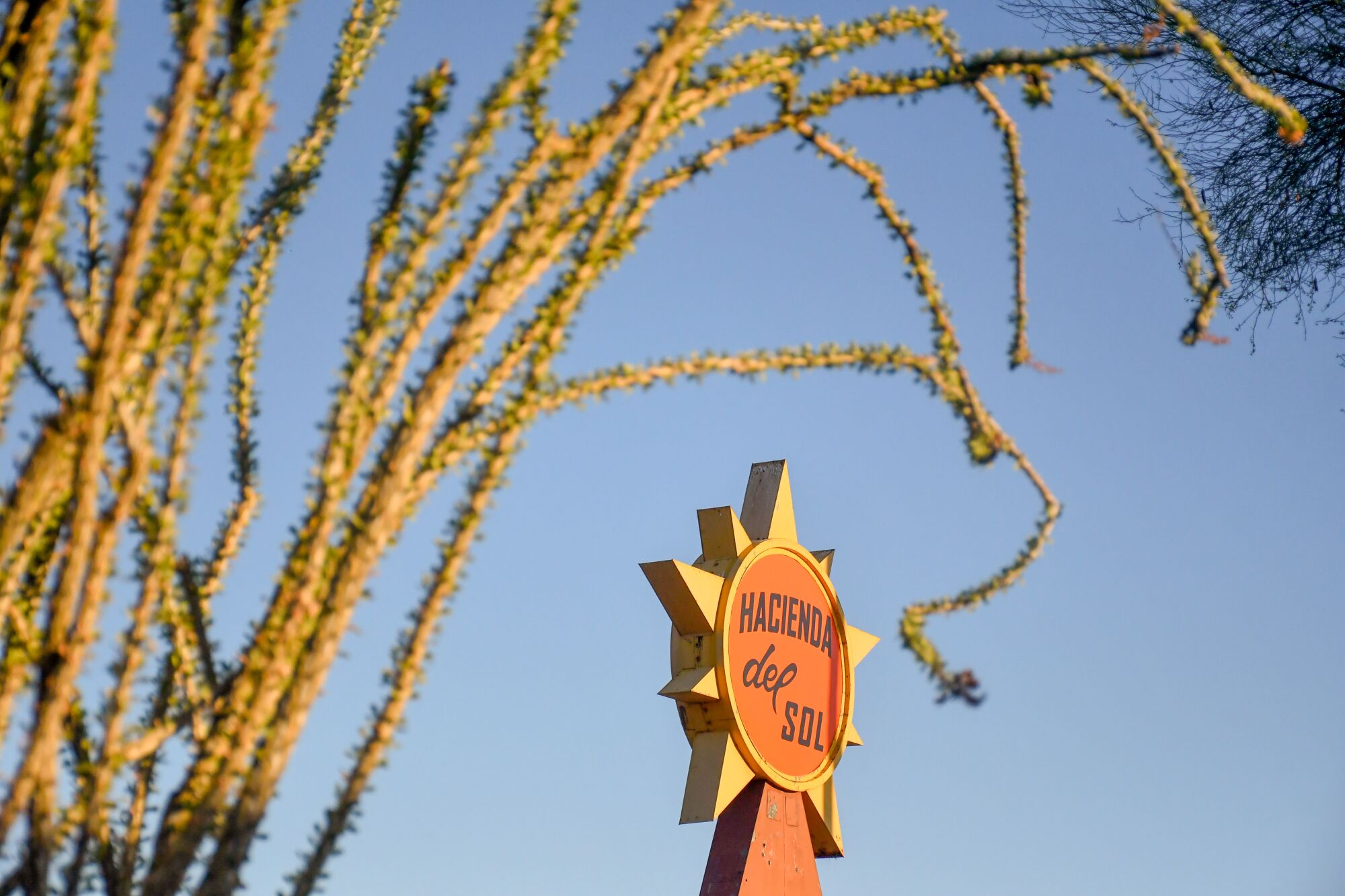
The Hacienda del Sol is a motel in the center of Borrego Springs.
(Christopher Reynolds / Los Angeles Times)
“We just got that working again,” said Kristen Gómez, part of the team that bought the hotel in summer 2021. “The letters were falling off.”
Meanwhile, next to the steadily expanding Borrego Art Institute down the street, chef Thomas Hildebrandt has bought Kesling’s Kitchen and is using a wood-fired oven and fresh ingredients.
“The pandemic brought a whole new demographic to the area,” said Françoise Rhodes, executive director of the Borrego Springs Chamber of Commerce. “The mall is completely full [of tenants], and that hasn’t been the case for years.”
“I think we’re seeing a generational change,” said Matt Davis, 41, who bought a Borrego Springs duplex with his parents in 2018, fixed it up to emphasize its midcentury features, and rents out the units through Airbnb.
This evolution is unlikely to set off a real estate boom or induce a stampede of vacationers. Borrego Springs remains a town with no stoplights, no national chains, two grocery stores, many retirees and one grand traffic roundabout, Christmas Circle, whose grassy center is a green dot in a vast field of dusty beige.
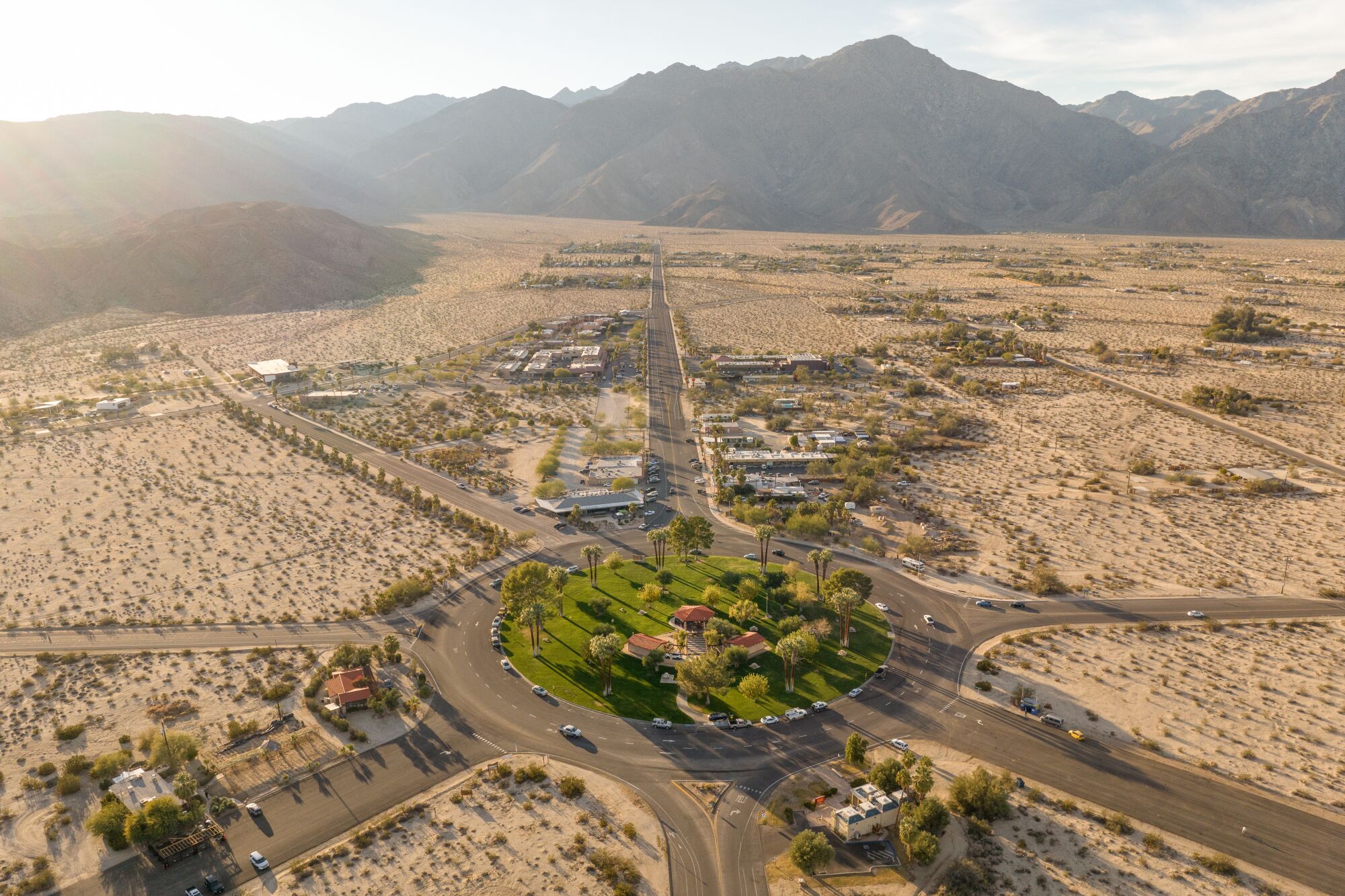
The Christmas Circle Community Park in Borrego Springs is an oasis of green in the desert landscape.
(Myung J. Chun / Los Angeles Times)
Lacking mail delivery, most residents pick theirs up at the post office. Lacking volunteers after two years of pandemic, local boosters were able to stage the annual Borrego Days celebration in October, but not the parade that usually goes with it. Lacking a water source beyond this valley’s dwindling aquifers, the community is under state mandate to cut water use by 75% by 2040.
Even with the snowbirds and their RVs in town, swelling the winter population to twice or three times its summer total, Borrego Springs is a small place under a big sky.
“I thought it was going to be a lot bigger,” said Heather Thurman, a photographer from Boise, Idaho, who arrived in October on her first visit to Borrego Springs.
But Thurman, who had come to meet up with her mom, wasn’t exactly complaining. As she spoke, she drifted in the swimming pool at the Courts, where $20 buys a day pass and the clubhouse is stocked with tennis merch and fine-art books.
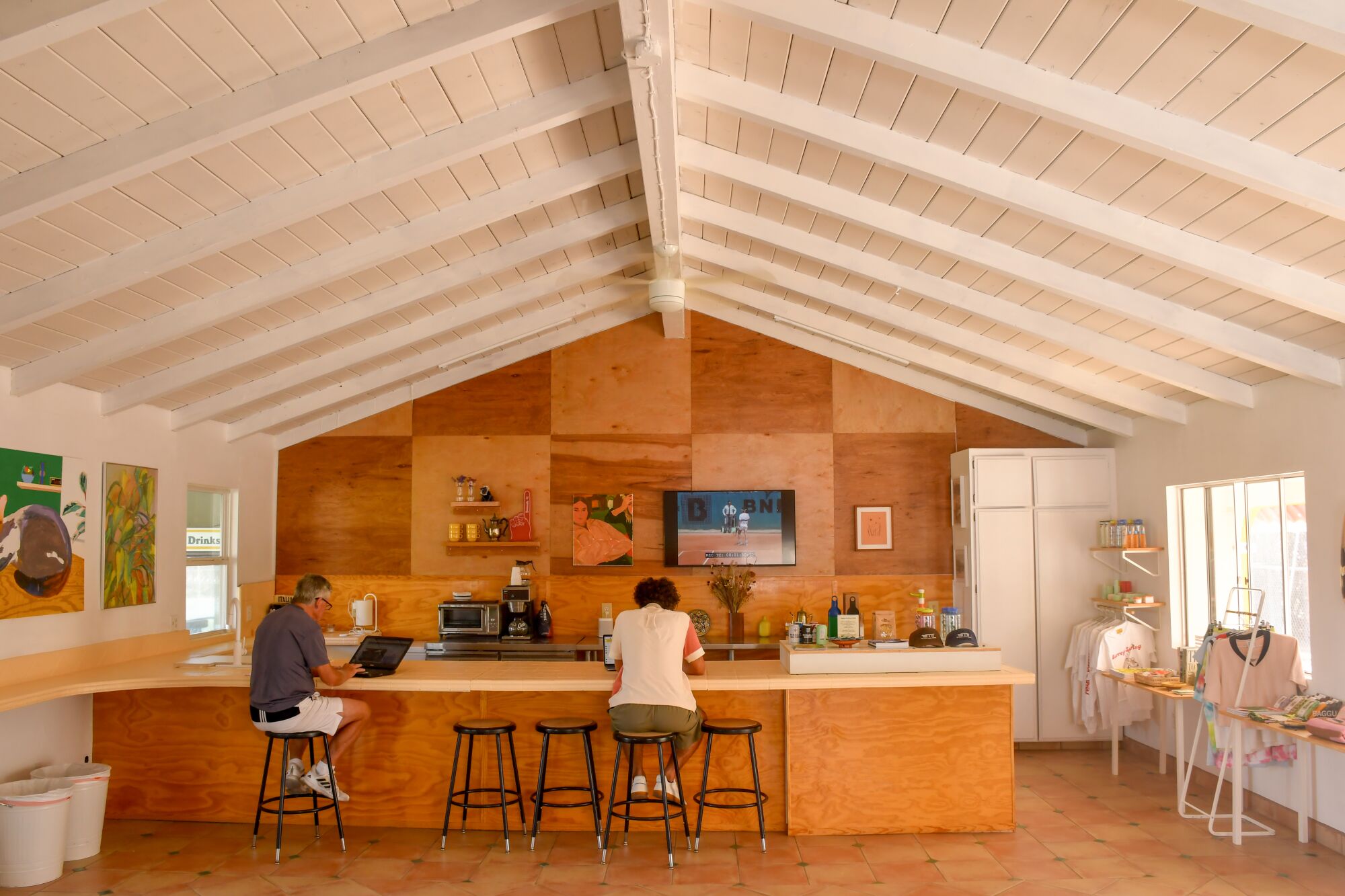
The clubhouse at the Courts includes a fireplace, couches and a counter comfortable for reading and scrolling.
(Christopher Reynolds / Los Angeles Times)
“There’s the old Borrego, and there’s the kind of new Borrego,” Adil Dara told me the next day, standing in that clubhouse.
Dara, 37, opened the Courts in fall 2018 with his wife, Leah Goren. From the Instagram-ready look of the place, it’s clear that their day jobs are in design. The eclectic contemporary lounge music on the sound system (and the absence of pickleball) gently makes clear that this is not your grandfather’s tennis club. By early November, the trailers were already booked through April.
Dara and Goren, who moved west from New York about five years ago, came across Borrego Springs on a drive between his parents’ house in Palm Desert and hers in Carlsbad.
“We were driving through the badlands, and it was going on and on,” Dara recalled, “and then you get dumped into this tiny town. We were just amazed.”
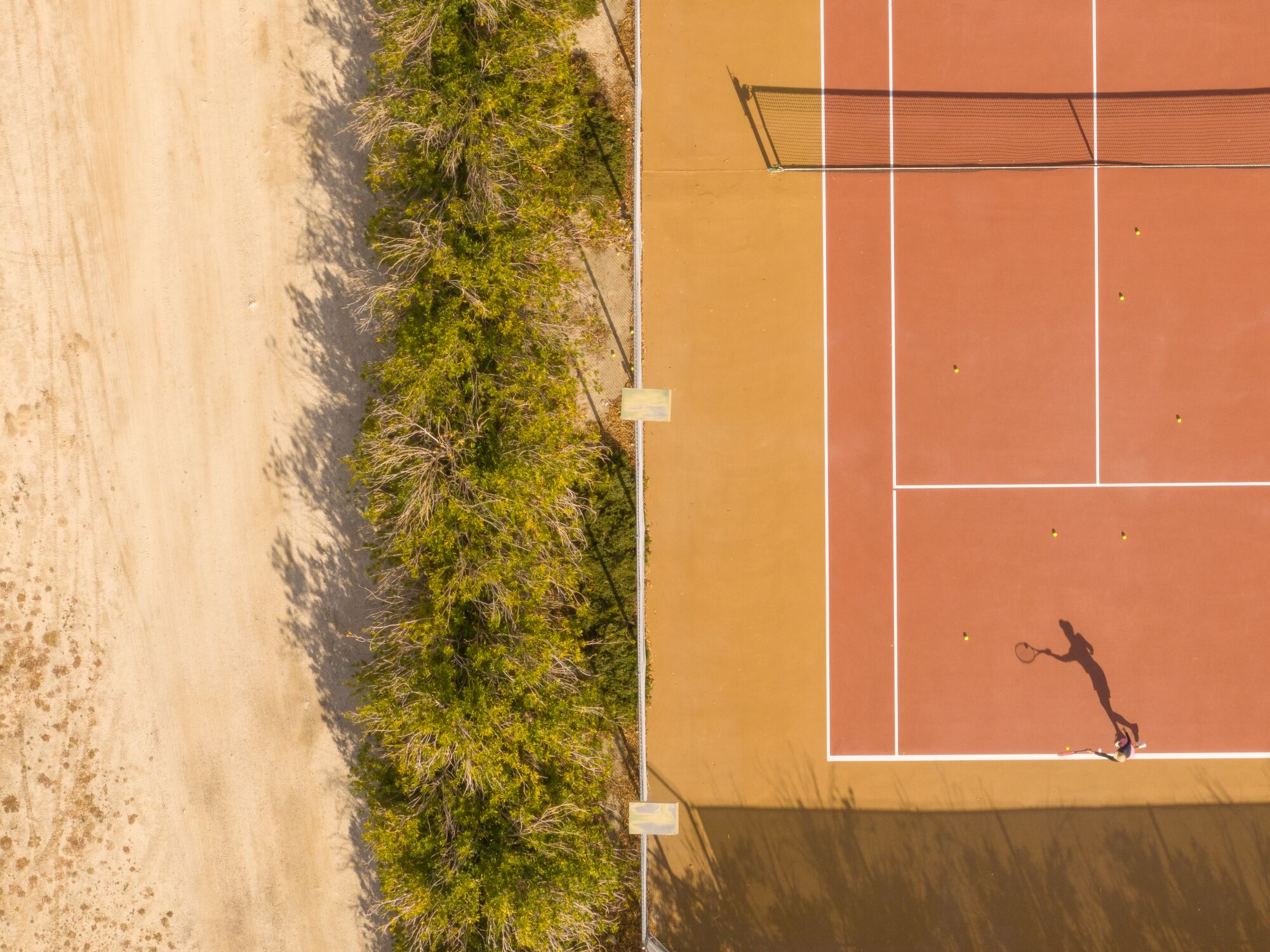
The Courts at Borrego Springs, opened in 2018 by husband and wife Adil Dara and Leah Goren, is open to the public Friday to Sunday.
(Myung J. Chun / Los Angeles Times)
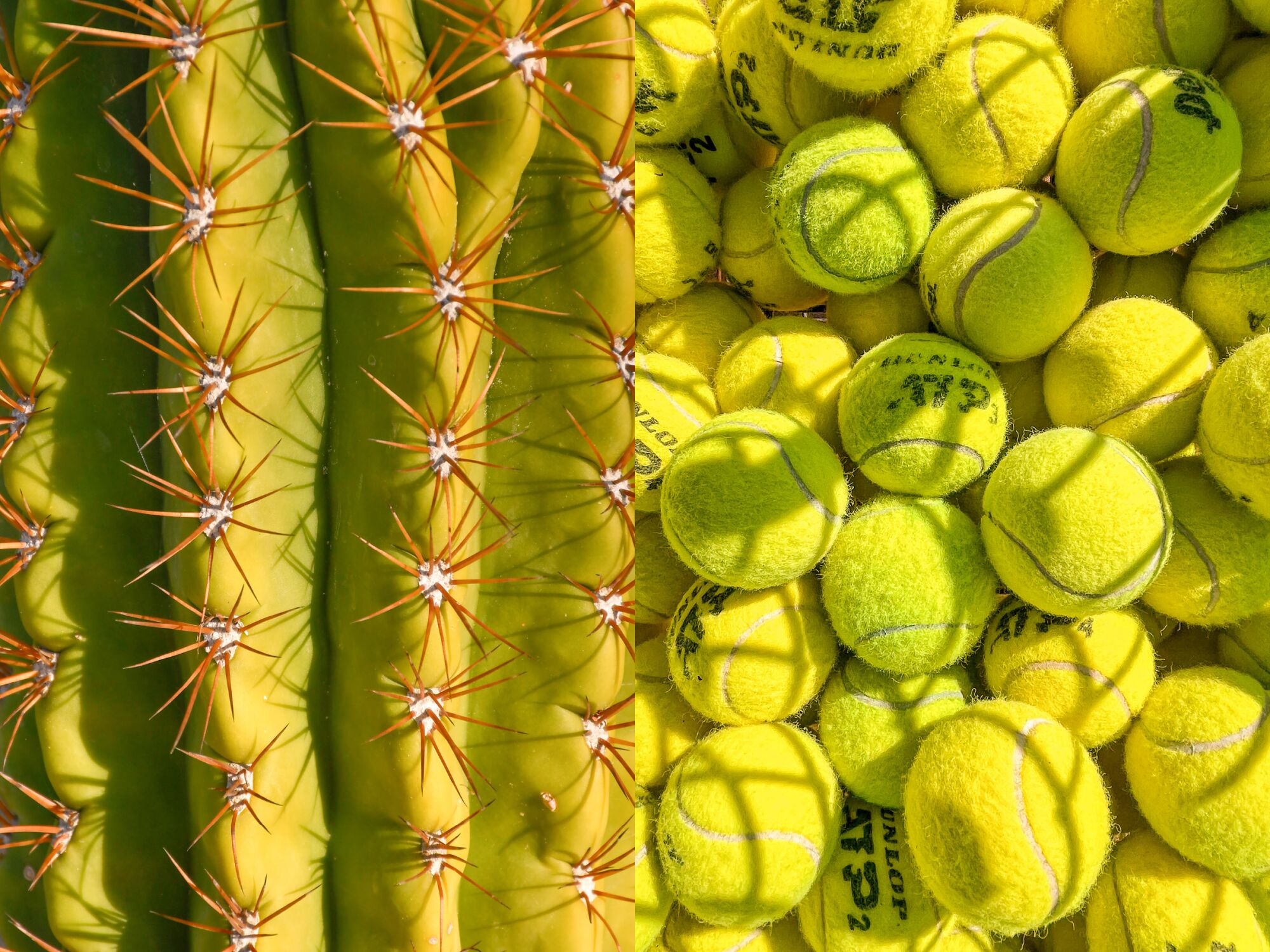
Borrego Botanical Garden, Borrego Springs, left; tennis balls in a basket at the Courts.
(Christopher Reynolds / Los Angeles Times)
They learned that the tennis center property was for sale and decided to take a chance. Now, raising a 1-year-old, they alternate between the desert and a home in the San Gabriel Valley, renting out the Courts’ trailers on weekends, setting guests up with tennis lessons, often hosting photo shoots in between. Some people “come to hang by the pool and don’t even play tennis,” Dara said.
Others might come for the serpent. The beast emerges from the sand at Borrego Springs Road and San Ysidro Drive. It features the face of a Chinese dragon, the tail of a rattlesnake and the wriggling pose of a half-submerged Loch Ness monster, swimming through sand.

The Borrego Springs serpent sculpture rises from the desert floor at Galleta Meadows. Local philanthropist Dennis Avery in 2008 commissioned sculptor Ricardo Breceda to create the works that populate Galleta Meadows and around town.
(Myung J. Chun / Los Angeles Times)
Local land owner and philanthropist Dennis Avery (an heir to the label company fortune) in 2008 commissioned sculptor Ricardo Breceda to make it.
Breceda went on to place more than 130 metal works on Avery properties around town. The figures include a few human subjects, but mostly they’re historic and mythic beasts, some made to scale, others wildly magnified, like the Subaru-sized scorpion. By the time Avery died in 2012, they’d already begun to emerge as civic mascots.
You can get detailed directions to the works at the Borrego Springs Chamber of Commerce and Visitors Bureau (786 Palm Canyon Drive) or the Anza-Borrego Desert Natural History Assn.’s Desert Nature Center (652 Palm Canyon Drive).
And once you get beyond them, the deep desert begins.
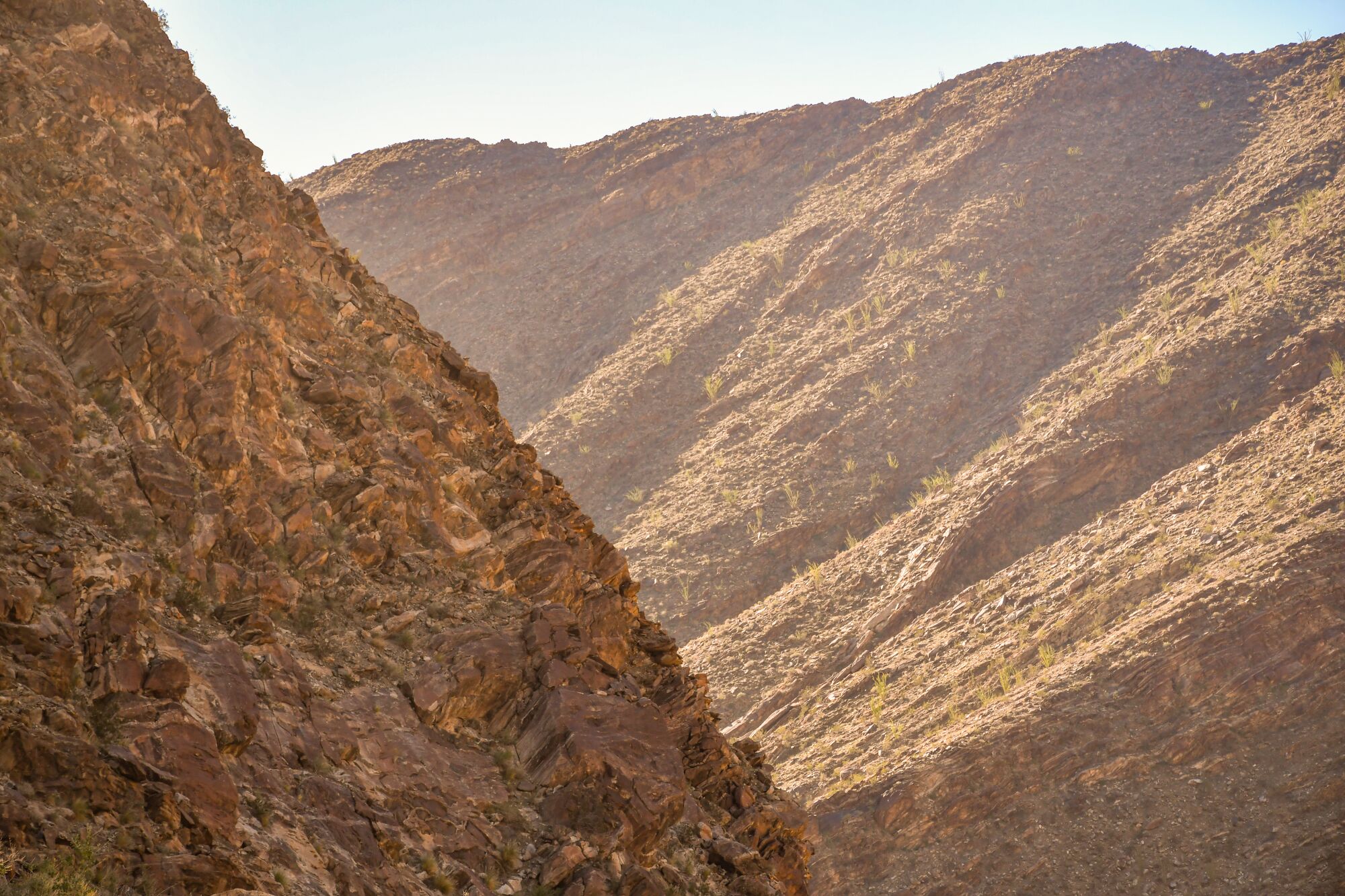
Palm Canyon Trail, Anza-Borrego Desert State Park.
(Christopher Reynolds / Los Angeles Times)
The town is surrounded by Anza-Borrego Desert State Park — about 650,000 acres of badlands, sand, boulders, slot canyons and Washingtonia filifera palms, the only kind native to California. Borrego is one of about 40 locales globally to be designated an International Dark Sky Community, a prime place for stargazing and night-sky photography.
“Bring water,” one of the park rangers likes to say at the entrance gate as visitors arrive. “Don’t ride the sheep. Don’t play with the rattlesnakes.”
Borrego Springs “is similar to what Palm Springs was in the early 1950s, a really small town,” said Elizabeth Rodriguez, owner-curator at the House of Borrego Springs shop on the main drag, Palm Canyon Drive.
“But we’re surrounded by the largest state park in California. We’re a doughnut hole and we can only grow so much. … Our focus is nature and being a dark skies community. So you won’t see a lot of up-lighting or neon lights here.”
That said, Rodriguez has expanded a bit. In 2021, she opened a House of Borrego Springs West Gallery across the patio from her midcentury vintage goods shop. When I stopped in, she was getting ready for a reception for three local artists.
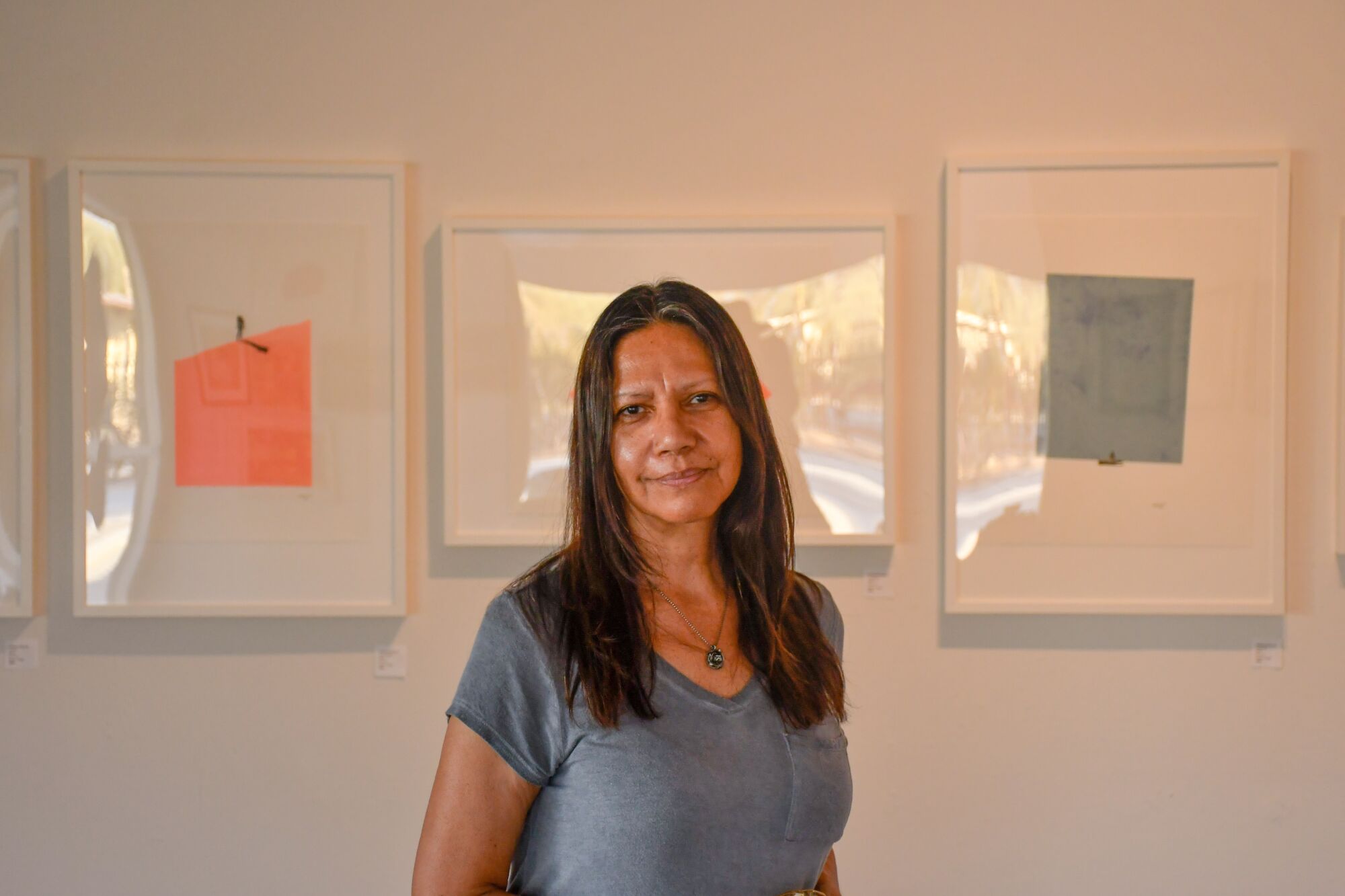
The House of Borrego Springs shop and House of Borrego Springs-West Gallery, both run by Elizabeth Rodriguez, include art and vintage household goods.
(Christopher Reynolds / Los Angeles Times)
In a sense, those artists are a logical step in local history. The Cahuilla, Cupeño, Diegueño and Kumeyaay peoples, who lived here for generations, left behind plenty of rock drawings, now protected in the state park.
The state set aside the park land in 1933, and Civilian Conservation Corps crews spent many hours blazing trails and building faux ruins at some of the campsites.
Paved roads, telephones and electricity arrived in the 1940s, along with a fair sampling of Desert Modernist architecture. The Borrego Art Institute and Kesling’s Kitchen on Palm Canyon Drive, for instance, share a long, low, glass-walled building designed in 1951 by William Kesling and updated from 2011 to 2013 by Richard Orne. Back in the day, William Cody, William Krisel, Cliff May and Richard Zerbe — all big names in California Desert Modernism — designed many other buildings in town. (And the community’s sleek public library building, completed in 2018, looks like one of their grandchildren.)
By 1960, the De Anza Desert Club golf resort, La Casa del Zorro hotel and hundreds of homes and businesses had taken root, along with several citrus- and palm-tree farms (which today use about 70% of the community’s water).
Later came Rams Hill, a much-celebrated golf course designed by Tom Fazio.
But in the last half-century, more than one developer has shown up, dreamed big and fallen flat. Surrounding the town’s handful of golf courses, you find scores of vacation homes and hundreds of unsold lots.
“It’s a beautiful place, don’t get me wrong,” tennis teacher Jaroslav Medek, 72, told me. But “time has stopped here. I have lost so much money in Borrego. The worst investment in my life.”
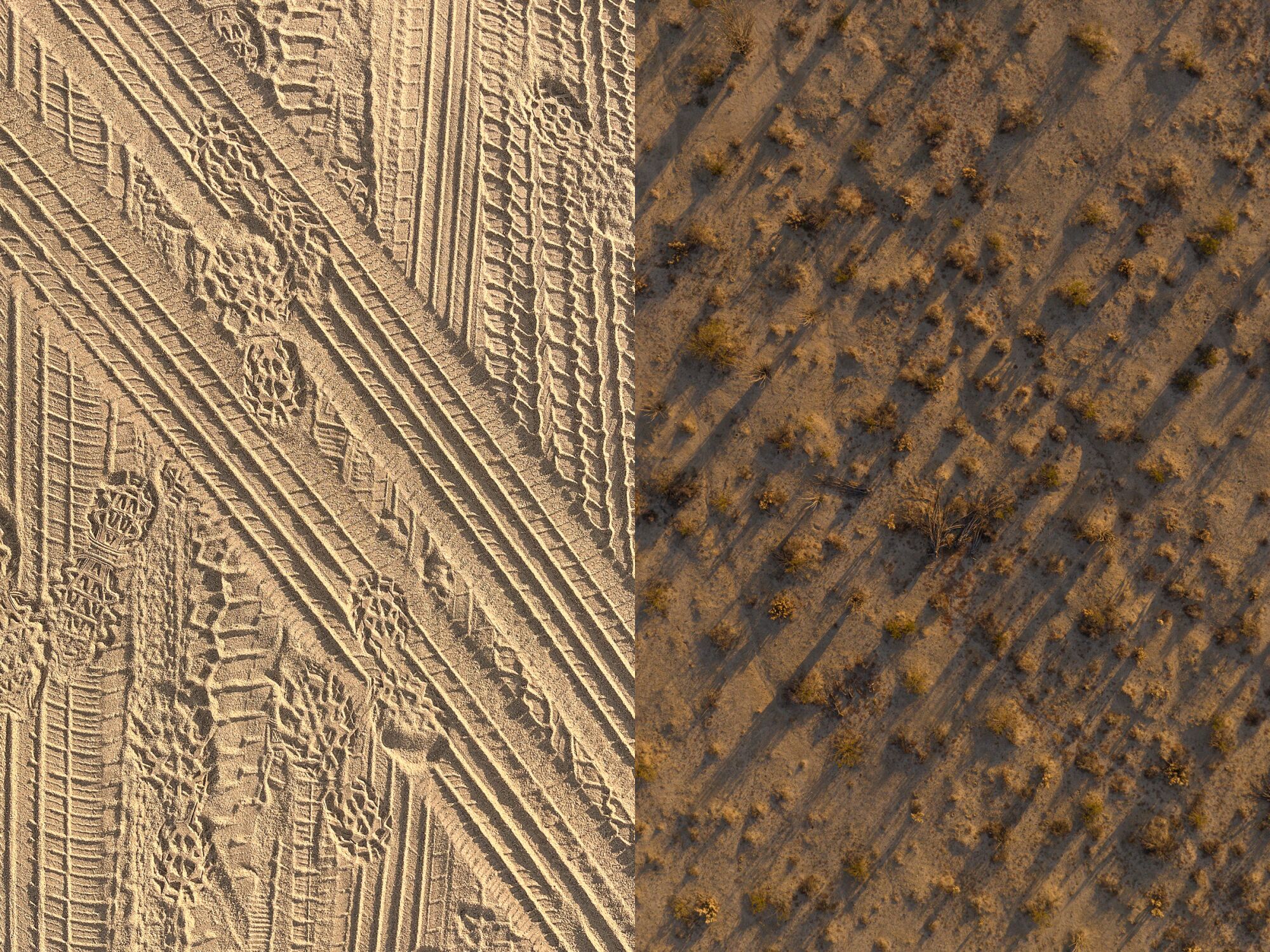
Visitors to Galleta Meadows in Borrego Springs leave behind footprints and tire treads in the smooth desert sand, left. Desert scenery in the early morning sunlight at Borrego Springs, right.
(Myung J. Chun / Los Angeles Times)
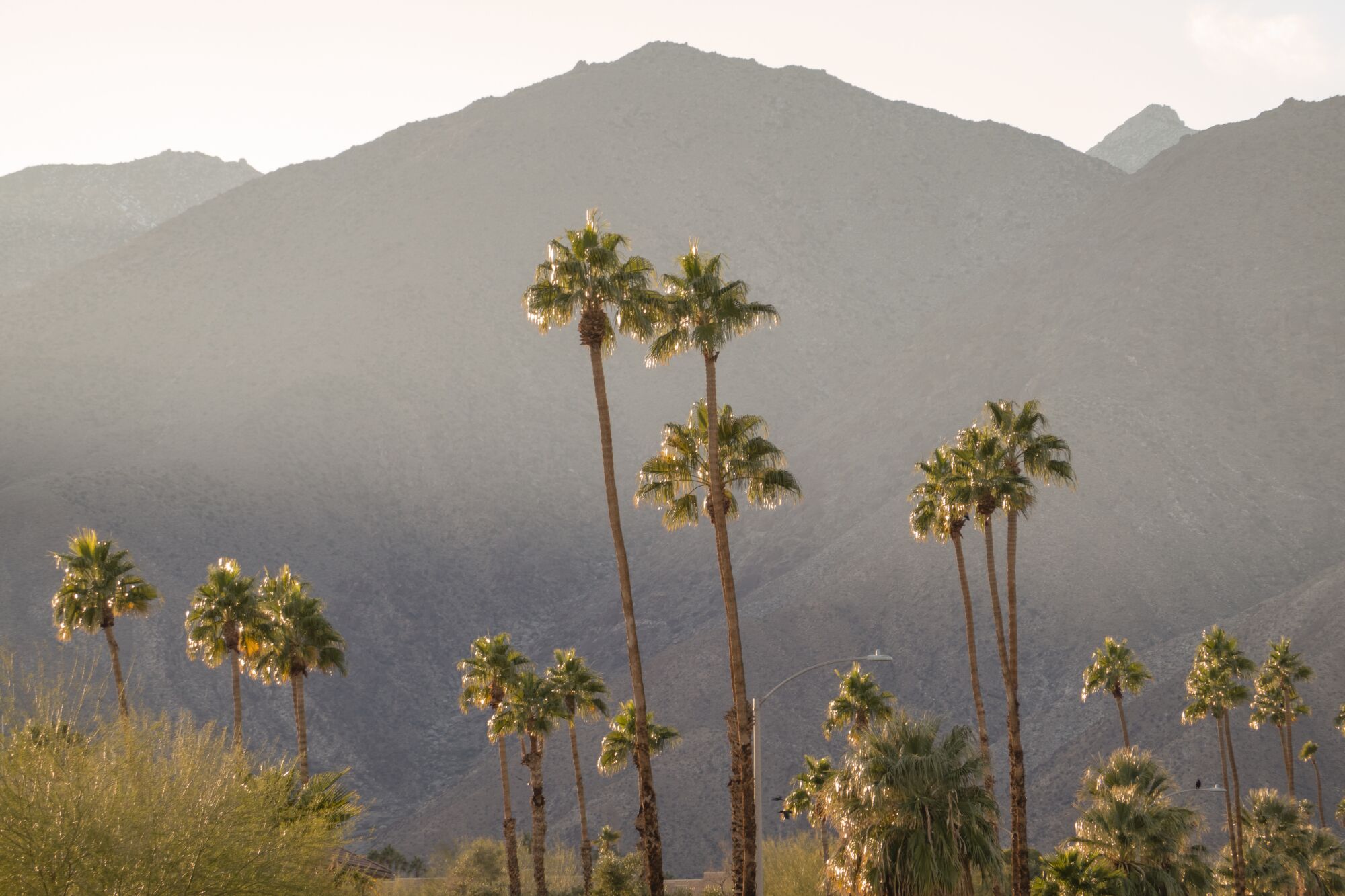
Palm trees glow in the afternoon sunlight on Palm Canyon Drive in Borrego Springs.
(Myung J. Chun / Los Angeles Times)
There’s only so much infrastructure — a limitation locals know well, having lived through the “Flowergeddon” superbloom of 2017, when a burst of spring wildflowers brought so many tourists that restaurants ran out of food and local resources were overwhelmed.
Still, Borrego’s modest economy and empty lots don’t seem to bother the roadrunners, coyotes and jackrabbits, or the dirt-road drivers headed for Font’s Point, or the hikers headed for Palm Canyon, Hellhole Canyon or Indian Head Peak. Nor do they daunt the current crop of entrepreneurs, who are mostly recycling old buildings, not putting up new ones.
At the very basic Borrego Springs Motel, which opened in 1947, owner Charlie Steidtmann took over in 2021. Innkeeper Robin Reynolds said the plan is to keep it simple: eight rooms, solar panels, saltwater pool, rates of $95 to $105, a “low-key, old-school, drive-up” situation.
At the more prominent Hacienda del Sol, which went up in the same year, “We’re taking it back to what it was supposed to be,” said co-owner Ben Fisher.
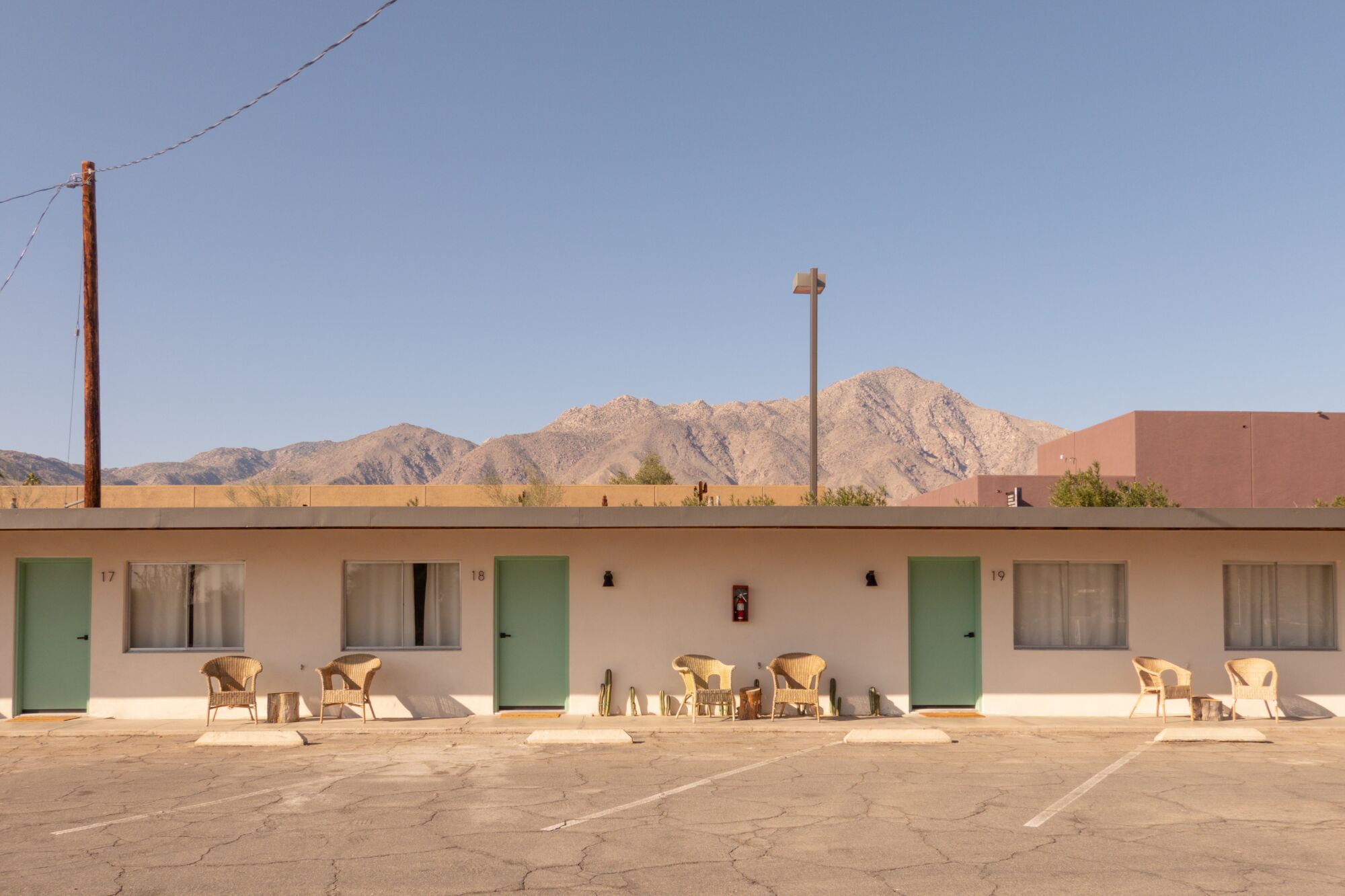
The Hacienda del Sol motel in Borrego Springs. Guests can reserve motor lodges, pictured, or casitas.
(Myung J. Chun / Los Angeles Times)
Fisher, 34, of Long Beach, said he has been visiting the area and running a Borrego Springs Airbnb property for several years. The new look of the 10-acre, 20-unit Hacienda, he said, “is a nod to the past with modern touches.” With 10 units now renting (and the others still being redone with sleek furniture by preservation specialist Jan Van Dijs), rates start between $159 and $209.
Fisher said he does feel “a new wave of energy” along Palm Canyon Drive. But “it’s so remote, you have to be in the know,” he said. “You don’t see it on the Travel Channel.”
If you go
Borrego Springs is about 150 miles southeast of L.A. City Hall. It’s reachable by way of Temecula (via I-15 and Highway 79) or by way of the Coachella Valley and Salton City (via I-10 and highways 111, 86 and 22). The Coachella Valley route is about 190 miles and makes for easier driving.
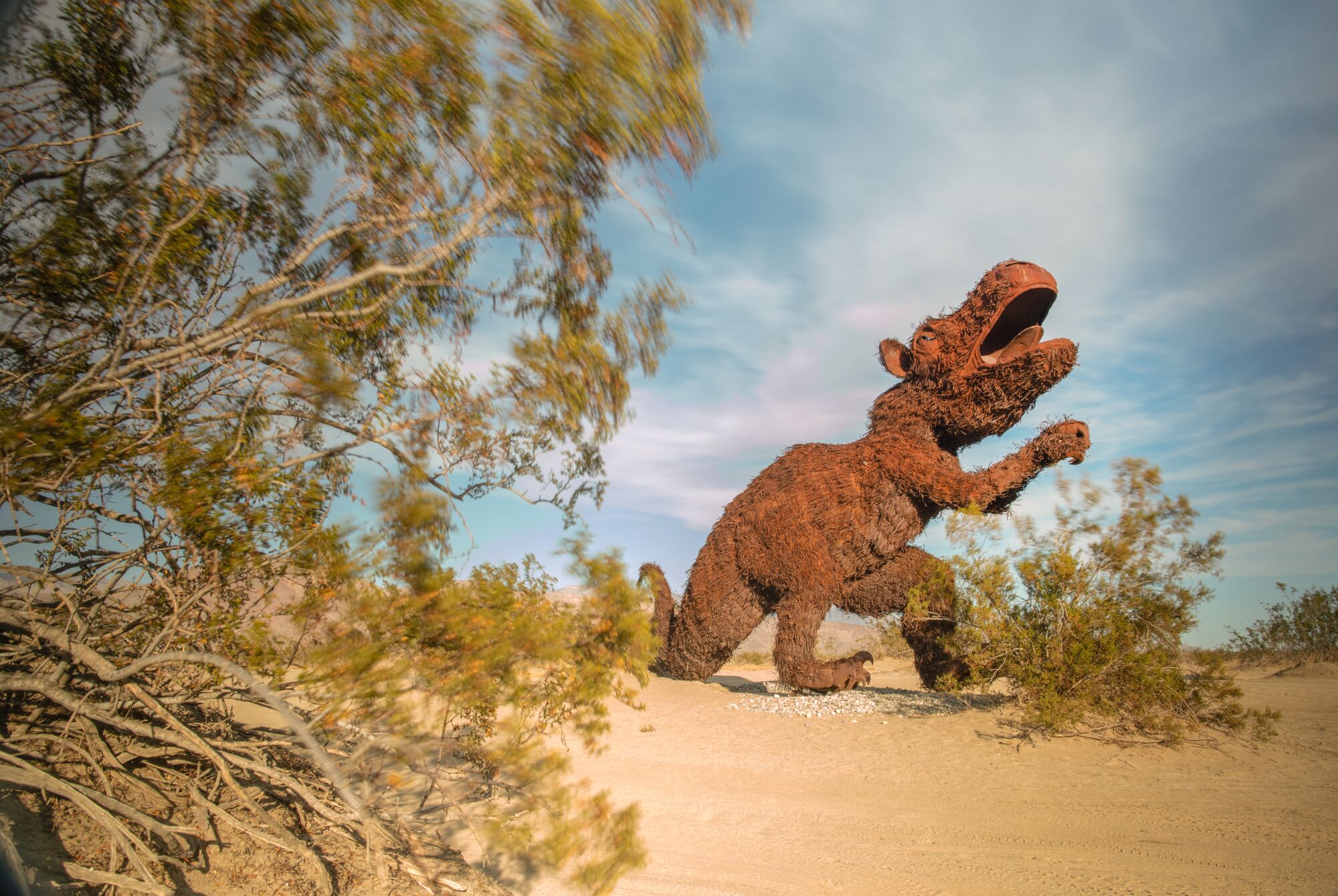
A Ricardo Breceda sculpture is on display at Galleta Meadows in Borrego Springs.
(Myung J. Chun / Los Angeles Times)
What to do
Take a hike. Hiking and camping happen in Anza-Borrego Desert State Park, 200 Palm Canyon Drive, Borrego Springs. Most hikers head first for the Borrego Palm Canyon Nature Trail (three miles round-trip), whose palm grove is handsome, though recovering from an arson fire in early 2020. There are campgrounds for tent people and RV people. Nonhikers browse the park visitor center and check out the desert pupfish in the pond at the Palm Canyon trailhead. Photographers rise early and take their four-wheel-drive vehicles up a four-mile dirt road to catch the sunrise badlands panorama from Font’s Point. There are more than 500 miles of rough roads and dirt trails in the park. (Also, the Ocotillo Wells State Vehicular Recreation Area is 22 miles to the southeast.)
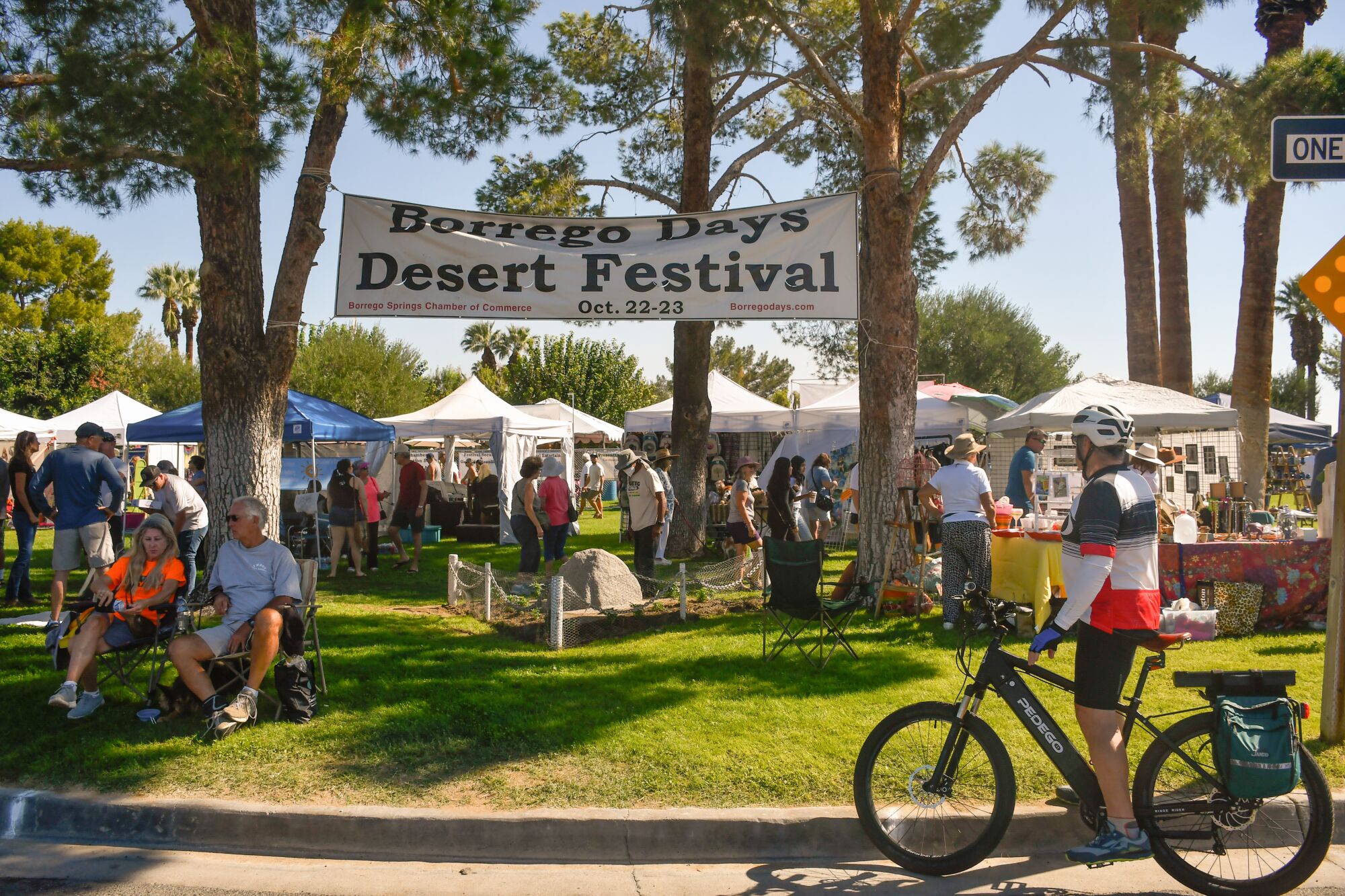
Borrego Days celebration fills Christmas Circle, Borrego Springs.
(Christopher Reynolds / Los Angeles Times)
Shop local. Christmas Circle Community Park is home to a farmers market on Friday mornings, fall through spring.
Go golfing. Golf courses in Borrego Springs include De Anza Desert Club (also known as De Anza Country Club); Rams Hill; Roadrunner Golf and Country Club; and the nine-hole the Springs at Borrego RV Resort & Golf Course.
Grab a racket. Fridays through Sundays, tennis players can rally at the Courts, 286 Palm Canyon Drive, which offers a $20 day pass. The Courts features four tennis courts, a pool and a clubhouse. (It’s closed on weekdays.) For overnight stays in cooler months, the Courts offers two rehabbed vintage trailers. At $190 per night, they’re more compact and basic than the fancy new Airstreams found at AutoCamp resorts in Joshua Tree and elsewhere. They’re full for the 2022-2023 season (and closed for the summer).
Where to sleep
Hacienda del Sol, 610 Palm Canyon Drive, open but still under renovation, currently offers six motor-lodge rooms and six “casita” units with kitchenettes, as well as a heated 40-foot swimming pool. Winter weekend rates typically range from $159 to $209. Eight more units are scheduled to open in 2023. (Reservations are accepted only online, not by phone or in person.)
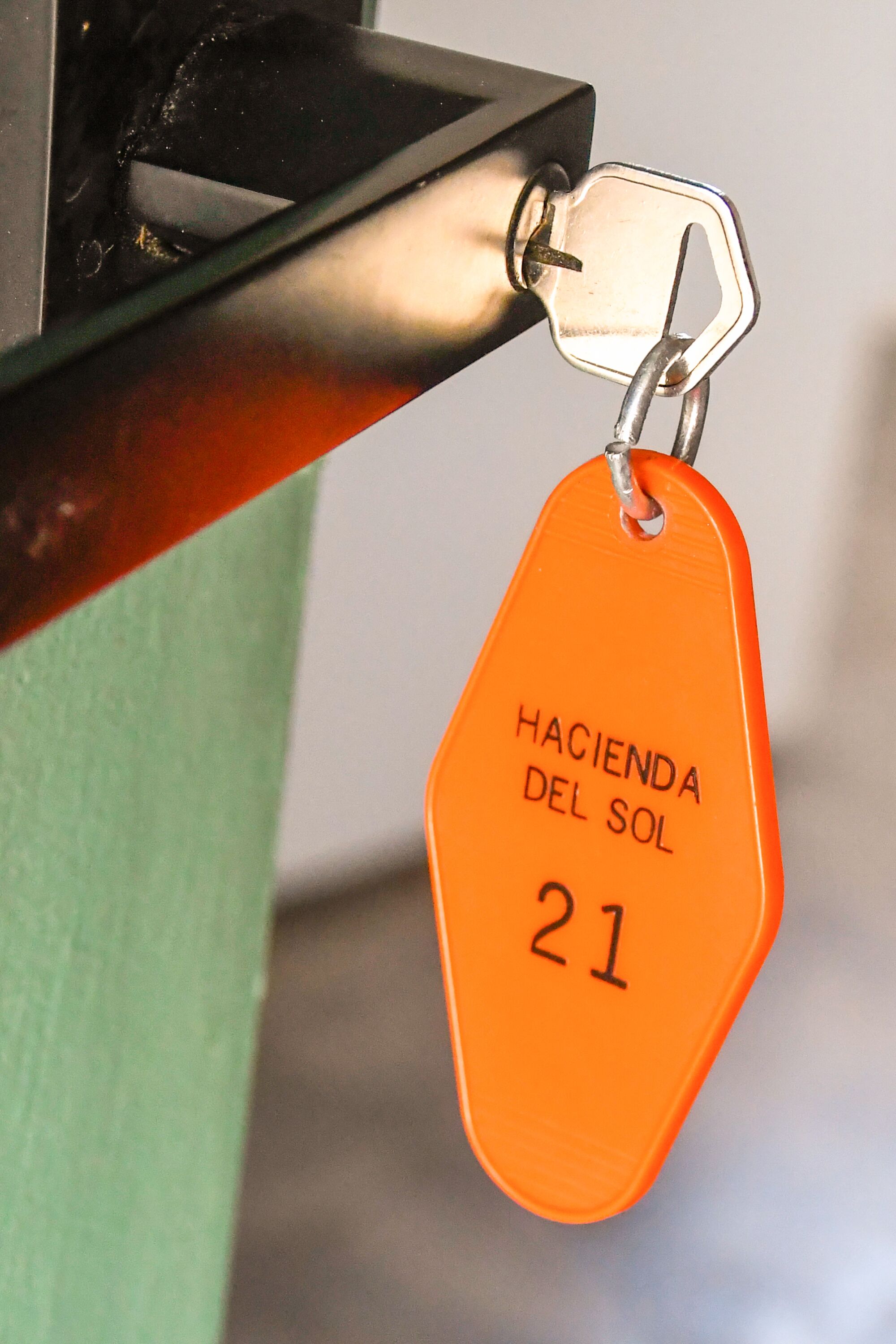
The Hacienda del Sol is a motel in the center of Borrego Springs.
(Christopher Reynolds / Los Angeles Times)
La Casa del Zorro, 3845 Yaqui Pass Road. Here are 67 rooms and casitas, along with 28 pools and whirlpools, a restaurant and a bar on 42 acres. Besides four tennis courts, eight pickleball courts and yoga, it includes a spa that’s open five days a week. Winter weekend rates typically start at about $300 (including a $20 resort fee).
Where to eat
Kesling’s Kitchen, 665 Palm Canyon Drive, which opened in 2016, has an eclectic, ever-changing menu from chef Thomas Hildebrandt that might include steak frites or shaved Brussels sprouts salad and reliably offers wood-fired pizza. It’s not fancy — you order at the counter — but it’s more ambitious than most eateries in town. Wednesdays and Thursdays, noon to 7 p.m., Fridays and Saturdays noon to 8 p.m.
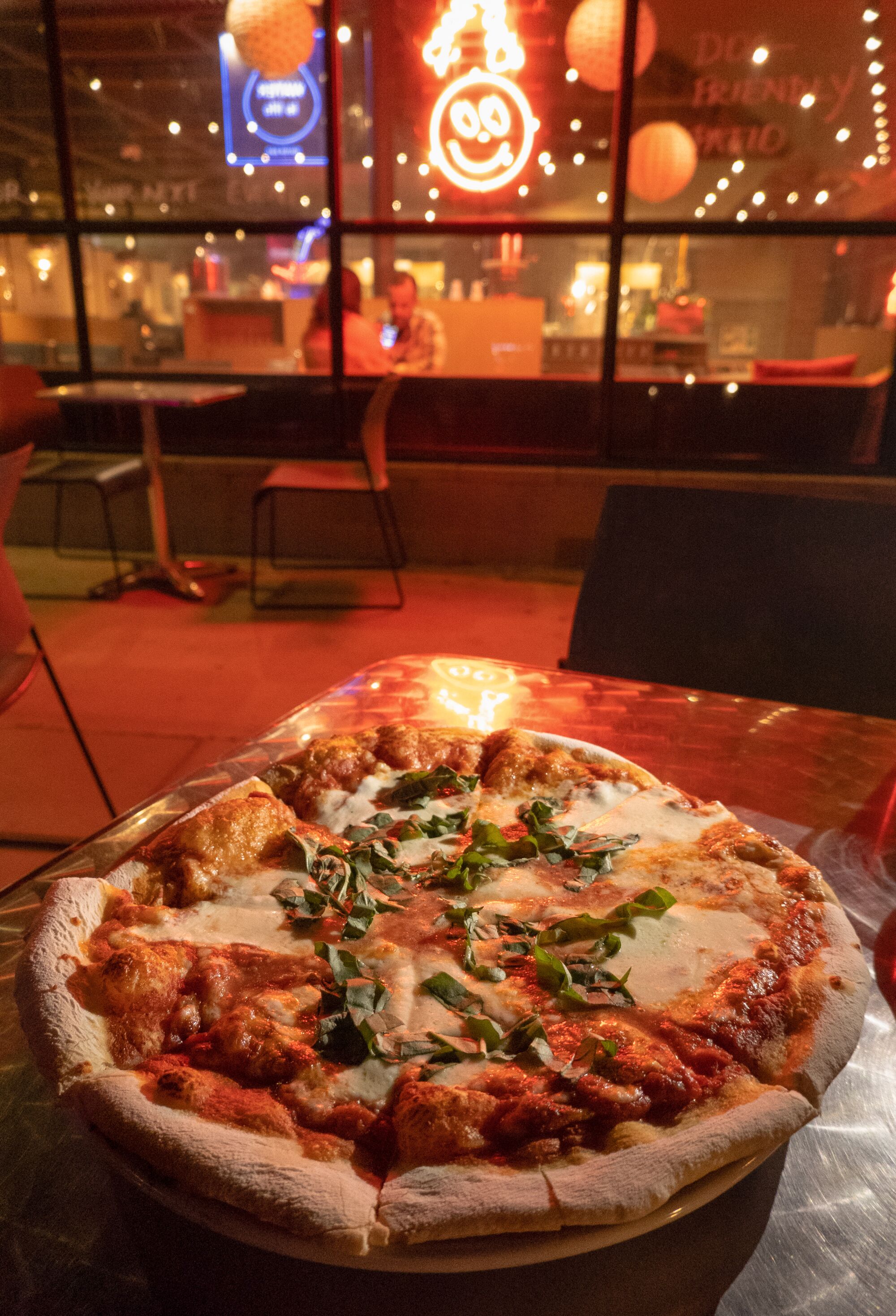
The Margherita pizza at Kesling’s Kitchen in Borrego Springs. The restaurant opened in 2016 and has an eclectic, ever-changing menu from chef Thomas Hildebrandt.
(Myung J. Chun / Los Angeles Times)
Kendall’s Cafe, 587 Palm Canyon Drive (breakfast and lunch), Calico’s, also 587 Palm Canyon Drive (pizza, coffee and shakes), and Carmelita’s Mexican Grill, 575 Palm Canyon Drive (hearty lunches and dinners and tasty pomegranate lemonade), are within about 100 feet of one another in the town’s modest mall.
Red Ocotillo, 721 Avenida Sureste. Open daily for breakfast, lunch and dinner, indoors or on the patio. Organic, farm-to-table emphasis. I liked my beef stroganoff, though it was a long time coming. (Like so many other places, Borrego Springs has a service worker shortage.)
Carlee’s, 660 Palm Canyon Drive. This is an old-school bar and grill, with a jukebox and pool table — “classy divey,” as one Yelp reviewer put it. The menu includes burgers, pizzas, sandwiches, pasta and steak. Open daily for lunch and dinner.




